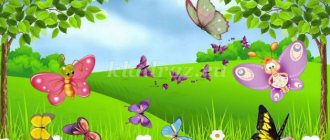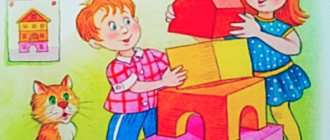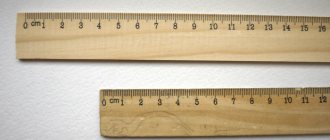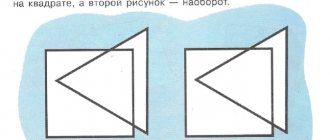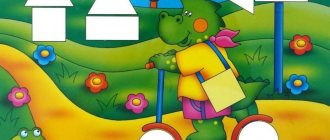When can you solve examples within 20
Once you have fully mastered the skills of counting to 10, it is recommended to begin activities on the second ten. All that is needed here is understanding, without prompting or copying from a neighbor. How to teach counting and explaining examples to a child within 20? You should follow the step-by-step method:
- Learn the ordinal count of the second ten, the order of each element of the number series. To facilitate memorization, use the same objects - cards, cubes. Write numbers only on the first ten units. Arrange them in rows, the first ten with signatures, and the second “blind” one under it.
- Remember according to scheme 14 - “- eleven” is added to the word four, and so on with each new term. The child must learn the meaning of the names of serial numbers from 11 to twenty.
- Start with the concept of the first ten, then add elements of the second row and pronounce the actions. “Ten plus four equals fourteen.” All data in the interval of the second ten should sound like this.
- Practice addition operations without transition. By type 10 + 6 = 16; 16 – 6 = 10. When this stage is mastered, actions of increased complexity are performed.
Puzzles for counting to 20
Examples with passing through ten require developing mental counting skills. Knowing the composition of a number when the sum is equal makes it easier to memorize the calculation algorithm for addition and subtraction within 100.
Card index of didactic games in mathematics for the second junior groups
Learning to solve examples up to 10
In order to learn to count correctly and instantly, you need to constantly solve examples. To calculate and memorize in the initial stages, emphasis should be placed on the child’s thinking based on visual images. This is where the problem arises: children often do not grasp mathematical concepts. The solution will be practical actions with real-life examples.
Learning to count
Teachers use three main methods to teach numeracy:
- Based on the principle of knowing the numerical composition
- Memorize tables of operations, including division and multiplication.
- Use special techniques to get results.
Let's consider all the methods in order.
Subtraction examples with pictures
The principle of knowing the composition
Preparation should begin with learning the basics of mathematics. When telling the child, you need to explain that each number is a group with a given number of elements.
Composition of numbers to remember
Important! It's not enough to count to five. Make sure you offer to show five fingers, place five candies on the table, or draw five circles on a piece of paper.
It is necessary to connect the number and fairy-tale characters or other objects familiar to the student:
- One turnip.
- There are two sides to a coin.
- Three Bears.
- Four cardinal directions.
- Five fingers on the baby's hand.
It is important to accustom the child to a picture connected with all the elements. It is necessary to play mathematical dominoes. To do this, you need to take ten cubes with an edge size of 1.5-2 cm, standing in a box. Lego parts will also work. If there are no suitable items, you can print other aids.
Based on knowledge of the composition, the child can decide whether to add or subtract. For example, to answer how much “six plus three” is, he must know that 6 and 3 equal 9. And “seven minus two” equals five, because 7 is 2 and 5.
A guide to studying composition
Memorizing tables by heart
There are a large number of techniques to teach your child to immediately memorize tables. Almost half of the examples for addition and subtraction are unconsciously memorized by children after completing their familiarization with the law of displacement.
You can take poetry, sing-alongs. The most popular example is the line of the song “Twice two is four, everyone in the whole world knows this.” Excellent information is found by becoming acquainted with Nikolai Zaitsev’s methodology and the “Song Know” program.
To consolidate knowledge of tabular data, you can invite children to work with:
- coloring books;
- computer games for mathematics;
- multimedia presentations.
The ability to improve on tests with an asterisk will help you learn complex material later.
Home exercises
Using Computational Techniques
The highest level of mental arithmetic results is the ability to find the fastest and most convenient method for calculating the total. For example, one of the easy ways to teach a student to count in class is the technique of counting and “jumping.” Children quickly learn that adding 1 produces the next value, and decreasing by 1 produces the previous value. After this, you can find out about the best partner of the number 2 - the grasshopper, which can jump over the number and cause the result of addition or subtraction of 2.
Modeling lesson in the younger group of kindergarten
